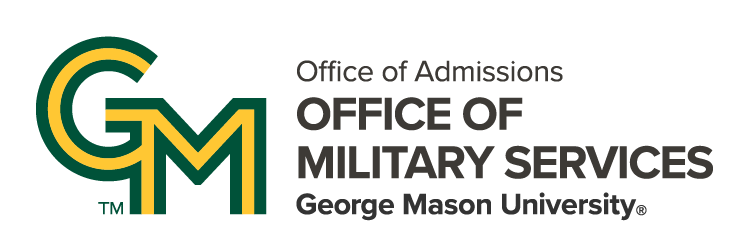
Josh, a therapy dog from Veterans Moving Forward, interacts with students in the Office of Military Services. Photo by Alexis Glenn
Joshua, a two-year-old black Labrador Retriever, padded through the Johnson Center last Wednesday afternoon during prime lunch time as he made his way to the Office of Military Services. Despite the distractions of food smells and loud chattering of students, Josh dutifully followed his trainer’s lead.
That’s because Josh is a service dog in training. His handler for the day, Karen Jeffries, is the president of Veterans Moving Forward (VMF), an organization that provides service and therapy dogs to veterans with physical and mental health challenges.
Jeffries has been working with Jennifer Connors, director of Mason’s Office of Military Services, about how the two programs can work together to help veterans at Mason.
“We’re open to developing a growing relationship with Mason,” Jeffries says.
“It’s amazing how the dogs let people open up,” Connors says. “We had them in our office once before, and people stayed to be with the dogs.”
Connors and Jeffries expect VMF will be on campus one or two times a week with dogs. These dogs can be used as tools for students who are feeling stressed or overwhelmed or having difficulty transitioning from a solider to a student.
Although he is still receiving service dog training, Josh is a registered therapy dog. This means he is able to help students with psychological problems, or “invisible wounds,” as Jeffries says.
A therapy dog will often be used as a distraction for people while they meet with a counselor.

Karen Jeffries, president of Veterans Moving Forward, with Josh in the Office of Military Services. Photo by Alexis Glenn
“They are actually very good at picking up vibes from people,” Jeffries says. “Frequently, a therapy dog will gravitate to the person in the room who is hurting the most.”
VMF begins training their dogs while they are still puppies. Through interaction with trainers and veterans, VMF determines if a dog is better suited to be a therapy or service dog and if the dog works better with men or women.
According to Jeffries, most therapy dogs are fully trained by the time they are 1 year old, and most service dogs are ready at 2 and a half years old.
Service dogs receive intense training that gives them the ability to carry heavy items for disabled veterans or to wake a veteran with post-traumatic stress disorder from a bad dream.
“These are not machines. There is more art than science involved. We have to take the time to find out what a dog’s talents are,” Jeffries says.
On campus, Josh was met with many smiles.
“I’m usually afraid of dogs, but I find him very calming. It’s quite unusual for me,” one student visiting the Office of Military Services says.
Some asked Jeffries if they could pet Josh. He wears a red vest to tell others that he is a service dog in training. A side pocket holds his “business cards.” In addition to Josh’s name, the cards list Josh’s trainer as well as information about VMF.
Although Josh is trained to ignore normal commotion, a stray squirrel running up a tree outside the Johnson Center got his attention. For this reason, Jeffries says Josh may be better suited to work as a therapy dog instead of a full-time service dog.
“Some dogs can’t not chase the cat,” she says. “Those dogs will never be service dogs, but they can be great therapy dogs.”
Service dogs must have more self-discipline than therapy dogs. With training, some service dogs are capable of carrying items, helping someone off of the floor and even dialing 911.
“They aren’t regular dogs, and they can’t be treated as pets,” Jeffries says.
Josh does get some time to play, though. Jeffries says it is important that he gets several minutes to play without his service vest.
“When that ‘uniform’ comes off, he is a regular dog,” she says. “He loves to run and play. It’s just like people behaving differently when they are wearing pajamas or a business suit.”
Connors wants VMF to have an active presence on campus, particularly during stressful times of the academic calendar such as midterms and finals.
Veterans who aren’t necessarily looking for therapy could also benefit from the program.
“We have a grant program called Mission Continues where veterans commit to 20 hours of community service a week for a living stipend. This could be a great opportunity for veterans to help train the dogs,” Connors says.
“College students make great trainers,” Jeffries agrees. “They can take the dogs with them to expose the dog to different environments.”
“Who knows where this is going to go, but it’s a great program,” Connors says. “The dogs really open up communication.”
More information about Veterans Moving Forward is available online and in the Office of Military Services.
